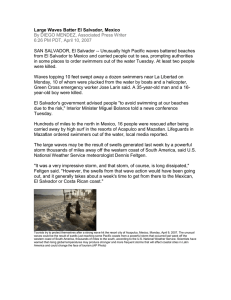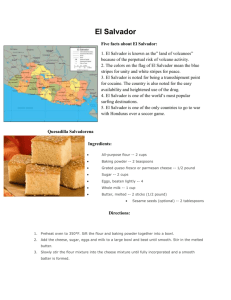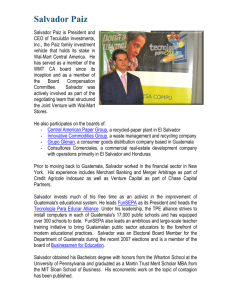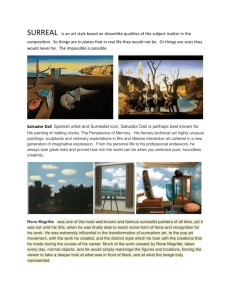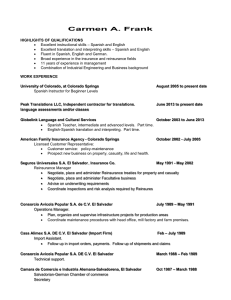Interview_of_a_Hispanic_Student
advertisement
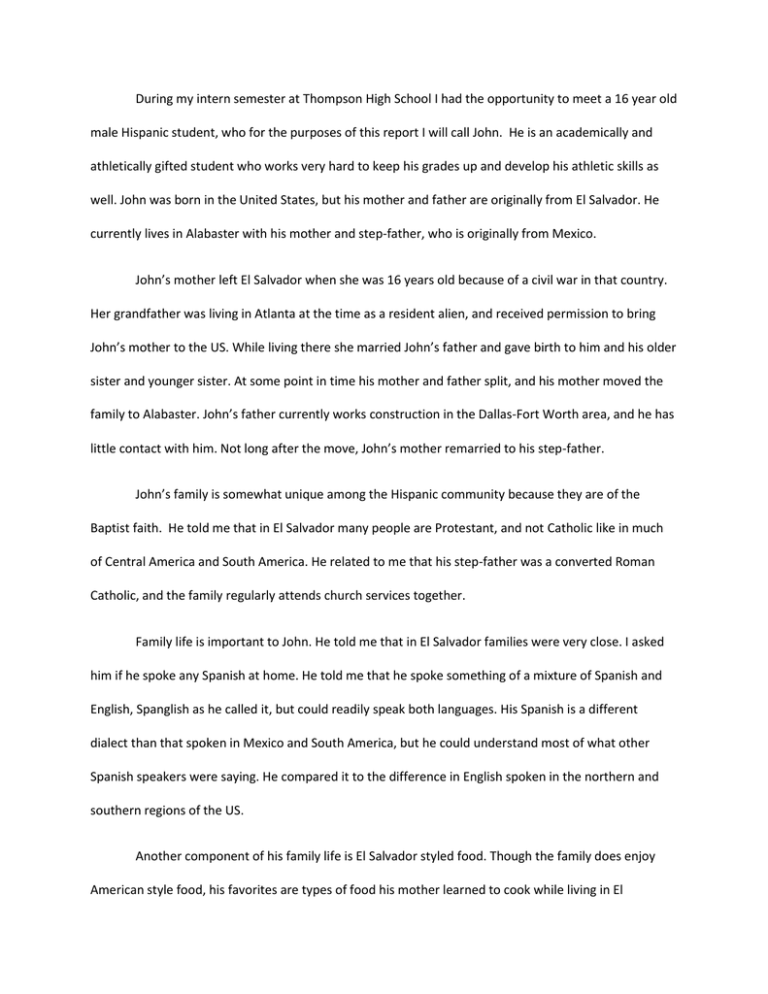
During my intern semester at Thompson High School I had the opportunity to meet a 16 year old male Hispanic student, who for the purposes of this report I will call John. He is an academically and athletically gifted student who works very hard to keep his grades up and develop his athletic skills as well. John was born in the United States, but his mother and father are originally from El Salvador. He currently lives in Alabaster with his mother and step-father, who is originally from Mexico. John’s mother left El Salvador when she was 16 years old because of a civil war in that country. Her grandfather was living in Atlanta at the time as a resident alien, and received permission to bring John’s mother to the US. While living there she married John’s father and gave birth to him and his older sister and younger sister. At some point in time his mother and father split, and his mother moved the family to Alabaster. John’s father currently works construction in the Dallas-Fort Worth area, and he has little contact with him. Not long after the move, John’s mother remarried to his step-father. John’s family is somewhat unique among the Hispanic community because they are of the Baptist faith. He told me that in El Salvador many people are Protestant, and not Catholic like in much of Central America and South America. He related to me that his step-father was a converted Roman Catholic, and the family regularly attends church services together. Family life is important to John. He told me that in El Salvador families were very close. I asked him if he spoke any Spanish at home. He told me that he spoke something of a mixture of Spanish and English, Spanglish as he called it, but could readily speak both languages. His Spanish is a different dialect than that spoken in Mexico and South America, but he could understand most of what other Spanish speakers were saying. He compared it to the difference in English spoken in the northern and southern regions of the US. Another component of his family life is El Salvador styled food. Though the family does enjoy American style food, his favorites are types of food his mother learned to cook while living in El Salvador. One of his favorite dishes is called papusa, a corn meal tortilla stuffed with rice or beans and a meat, often chicken. Another of his favorite dishes is tamales, which is also a corn tortilla stuffed with various ingredients and cooked in a corn husk. I asked him what the difference was between El Salvador’s food and that of what most people think of as traditional Hispanic or Mexican food. John said that the food from El Salvador is not as spicy, because they do not use the same type of seasonings such as habaneros and jalapeños. I then asked him if he had ever been to El Salvador or Mexico, but he has not. John told me he one day would like to go, but would probably not be until after he graduates high school. I asked him then what he knew about El Salvador. He said that there were some similarities to Mexico, but that most people spoke a different version of Spanish. Another difference was that most people were not Catholic, but of the Protestant faith. However like in Mexico, people there do not have even the most simple American commodities, such as pens and paper, cellphones, televisions, cars, and other everyday items that most Americans use every day. El Salvador is a very poor country, and many people have never even been to a large city. John does consider himself to be a member of the Hispanic community. He is proud of his heritage, and has a number of friends who are Hispanic. That is not to say that he does not also have friends from other racial groups. He sees himself as a person who is willing to accept all sorts of people so long as they respect him as a person as well. I find this to be true of him because he easily interacts with many of his classmates very easily, and he is a pleasant young man to be around. I asked John what he liked to do in his free time. He told me that he enjoys soccer and has played since he was a kid. John also likes to watch professional soccer from the Mexican, Spanish, and English Premiere Leagues. Like many of his friends he likes to go to movies and hang out on the weekends. However he is quick to point out that family time is also very important to him. Concluding the interview I asked John what he would like to do when he graduated. He told me he wanted to join the Marines, but his mother does not want him to do that. He said that he has always admired the recruiters when they come to school, but he does not want to go against his mother’s wishes. Police work is another possibility for him. He wants to go to college and study something to do with criminal justice, with the idea of becoming an investigator or CSI criminologist. Sociology is another area that interests him, and is a consideration for when he graduates.

